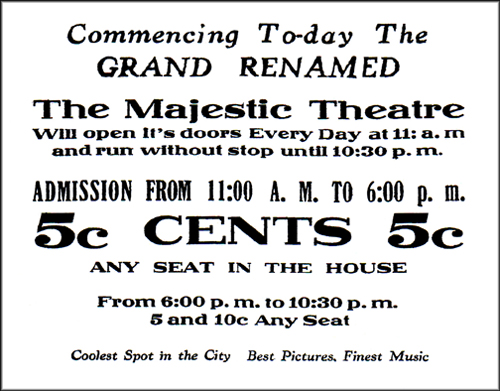An announcement in the June 8, 1914 edition of The Johnson City Staff contained an advertisement proclaiming, “Commencing Today the Grand Renamed The Majestic Theatre.”

The ad went on to say, “The Majestic Theatre will Open Its Doors Every Day at 11 a.m. and Run Without Stop until 10:30 p.m. Admission from 11 a.m. to 6 p.m., 5 Cents Any Seat in the House – From 6:00 p.m. to 10:30 p.m., 5 and 10 Cent Seats – Coolest Spot in the City, Best Pictures, Finest Music.”
In that same edition of the newspaper, the theatre’s management defined its future operating policies aimed at attracting new business. The change was initially aimed at ladies who came downtown shopping and wanted to spend time at a good, cool place and have an opportunity to see a first class motion picture at a nominal price of five cents. The modification likewise afforded farmers and their families and anyone coming to the city from nearby towns to likewise have access to a relaxing luxury.
The strategy developed by management was to combine convenience with comfort. Popular playhouses throughout the South, including Atlanta, Augusta, Chattanooga, Asheville and Jacksonville had found this policy to be popular and believed that it would meet with identical approval in Johnson City. In a nutshell, the Majestic wanted to make its theatre a memorable stopover experience for people.
The managing team secured for the public a Lubin masterpiece, “The Lion and the Mouse,” which had proven to be a phenomenal success in all the larger cities of Europe and America and had enjoyed an extended run in New York City. The story centered on an investigation of Standard Oil with the main character being a poorly disguised John D. Rockefeller. The production was billed as “but a foretaste of the really great features that are being booked by the Majestic.”
The administration desired that the people of Johnson City always feel assured that whenever a special feature was announced at the Majestic Theatre that it would be something worthwhile for them to attend.
To contrast the old Grand with the new Majestic, just three weeks prior to the renaming of the theatre, two quality plays were offered. A newspaper ad stated, “The Grand Theatre, Johnson City, Tennessee – The Frank Lea Short Company, Management of Russell Kanney, Presenting “Pomander Walk,” (Matinee) by Louis N. Parker and “Robin Hood and his Merrie Men” (Evening) – Saturday, May 16.
According to the newspaper, “‘Pomander Walk” ran for an entire year at Wallack’s Theatre in New York and was proclaimed to be the most charming play of the generation. The 3-act comedy was said to rout its audience out of the busy day and set them in a dream world. It said, “The sun comes out on Pomander Walk, the sun goes down on Pomander Walk, the moon beams o’er Pomander Walk; the lamp is lighted sentinel-like o’er Pomander Walk. You too are in Pomander Walk, one of its happy dreamers – irresistibly lured to its ingenious dreaminess. It is a delight.”
A description of the other play claimed, “’Robin Hood and His Merrie Men’ had universal appeal of the romantic story of the nobleman outlaw and his band. Robin Hood, Maid Marion, Alan-A-Dale, the valiant High Sheriff of Nottingham, Friar Tuck and King Richard of the Lion Heart himself were placed in a stirring romantic comedy.” It was said to be “alive with laughter and action and thrills and brilliant in pageantry costuming and setting.”
On that June 8 morning of 1914, a new theatre marquee was seen on Main Street, beginning a run that would continue for 67 years. The theatre closed its doors in 1981.
